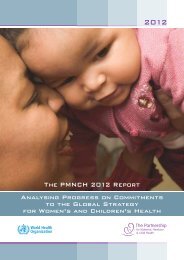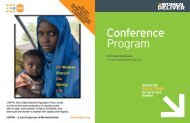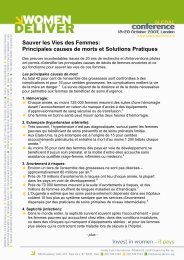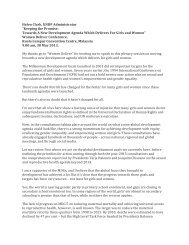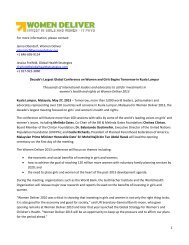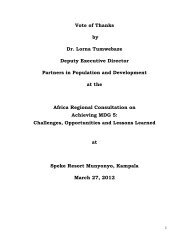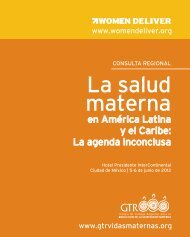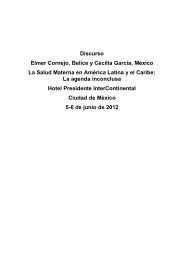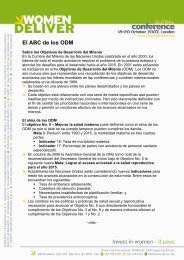State of World Population 2012 - UNFPA Haiti
State of World Population 2012 - UNFPA Haiti
State of World Population 2012 - UNFPA Haiti
Create successful ePaper yourself
Turn your PDF publications into a flip-book with our unique Google optimized e-Paper software.
ut conventional family planning messages aboutplanning their families are irrelevant. Addressingtheir needs and overcoming barriers to theiraccess to family planning requires emphasis oncontraception and disease prevention as wellas comprehensive sexuality education, which isgrounded in human rights including equality andnon-discrimination, reflection about gender roles,sexual attitudes and behaviour (Cottingham,Germain and Hunt, 2010).2 Unmarried people <strong>of</strong> all agesRelative to previous generations, greater numbers<strong>of</strong> young people and adults <strong>of</strong> reproductiveage are having sex outside <strong>of</strong> marriage, withno immediate desire to have children (Ortega,<strong>2012</strong>). Ensuring their access to family planningregardless <strong>of</strong> their marital status requires anacknowledgement <strong>of</strong> sexual activity for pleasureand intimacy before and after marriage as well aswithin it.Most people in the world marry, and mostsexual activity does take place within marriage(United Nations, Department <strong>of</strong> Economic andSocial Affairs, 2009). Yet many people who havenever married or whose marriages have endedare sexually active and wish to use family planning.Recent data highlight that interpersonalcommunication among adults about familyplanning—and actual family planning use—isincreasingly taking place while they are single,separated, widowed or divorced.When <strong>State</strong> family planning programmesexclude these non-married groups, family planningmarginalizes a growing portion <strong>of</strong> thepopulation. Though religious practices and socialnorms suggest that marriage is a pre-requisitefor sexual activity, the <strong>State</strong> has an obligation toensure access to family planning to all peopleirrespective <strong>of</strong> their religious beliefs and sexualpractices without discrimination.In some countries, the proportion <strong>of</strong> nevermarriedadults is increasing (United Nations,Department <strong>of</strong> Economic and Social Affairs,2009). Over the last 40 years, the number <strong>of</strong>countries where at least 10 per cent <strong>of</strong> womenhave never married by age 50 has increased from33 to 41. Larger proportions <strong>of</strong> men are also notmarrying. Between 1970 and 2000, the number<strong>of</strong> countries where at least 10 per cent <strong>of</strong> men donot marry before their 50th birthday increasedfrom 31 to 49.Use and unmet need among adolescentswho wish to avoid pregnancy in thedeveloping world53%No method Traditional method Modern methodAdolescents who wantto avoid pregnancySub-Saharan AfricaUnintended pregnanciesamong adolescents32South Central and Southeast AsiaLatin America and the Caribbean81%15% 8%32%54%14%32%39%9%11%83%7%10%75%17%52% 8%Source: Guttmacher Institute and International Planned Parenthood Federation, 2010a.THE STATE OF WORLD POPULATION <strong>2012</strong>51




